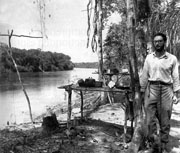
The concept of place
International Landscape Study Days
2010, seventh edition
5th-6th February
Why insist on the concept of place? What meanings can be attributed to this word?
What new theoretical insights and practical uses does it offer?
Various European experiments in landscape management and design are seeking a way to reorganize the tools they use and to reach beyond the time-consuming and tedious controversies over things and their names.
The concept of place shakes free of these disputes and opens a new area of theoretical and practical initiative, entirely theoretical but already promising, which is capable of challenging any partial hegemony: from the iconographic-perceptive dominance of the landscape and humanistic tradition to the scientific-naturalist line of environmentalism and to the economistic-administrative perspective of the urban planning approach. This study proceeds via discrete investigations, like real research, and is conscious of being only at the beginning. Its objective is to devise a concept which is capable of embracing and representing the meanings and values of the natural and historical heritage, the passions and the tensions of the living community. It involves continuing to ponder on the material and spiritual constitution of the person-place and society-place relationship, on its universality and its changeable nature. It entails giving a theoretical and practical, ethical and legal, conservation and planning framework to every portion of territory that evinces the form, the life, the characteristics and the dimensions corresponding to the settlement of a recognizable and responsible community.
The Study Days will be dedicated to Claude Lévi-Strauss (1908-2009) in recognition of his crucial contribution to our understanding of the universal nature of the “need of place”.
